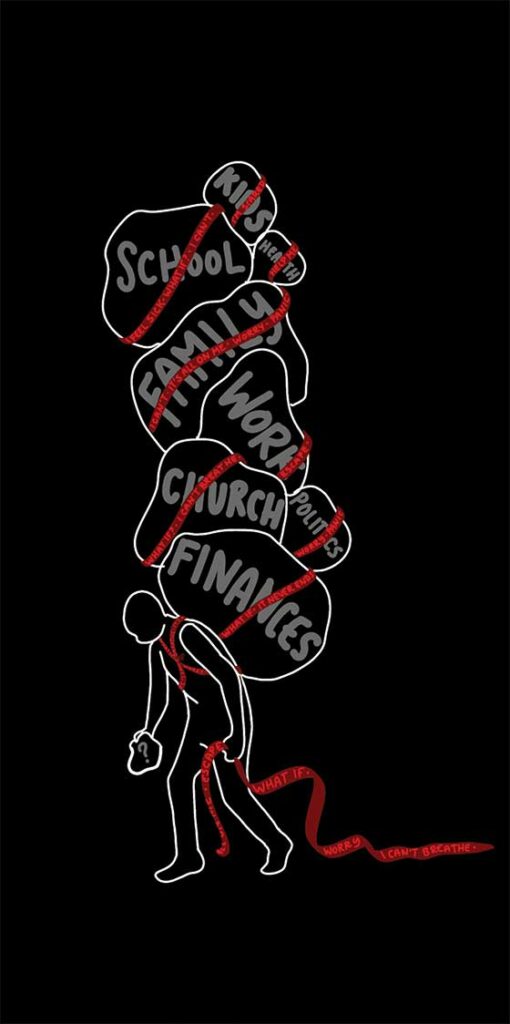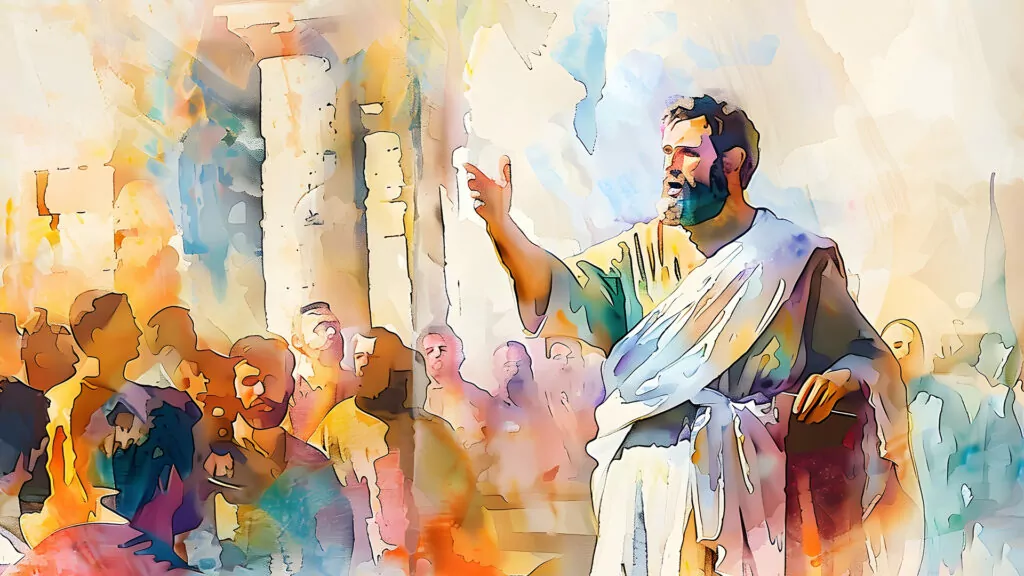“Do not be anxious about anything, but in every situation, by prayer and petition, with thanksgiving, present your requests to God. And the peace of God, which transcends all understanding, will guard your hearts and your minds in Christ Jesus.” – Philippians 4:6-7
When does care and concern cross a line and become a problem?
I found the answer to this question the hard way: a painful and confusing burnout about six years ago, followed by years of learning, counseling, and slow change. My journey isn’t over yet, but I now see how I could have prevented much pain if I had truly understood, and repented from, my misguided response to worries, fears, and anxieties prior to that burnout.
Knowing just how prevalent anxiety has become, also among Christians, I’m sharing my story here with the hope that it will help others in their walk with the LORD.
Worry, care, and concern
In a two-part podcast on the topic, biblical counselor Dr. Greg Gifford explains that the Bible uses the same Greek word in three different ways to describe anxiety. One sort is warned against, but in the other two instances a form of anxiousness is encouraged.
So, first, in Matthew 6, we read Jesus warning us:
“…do not be anxious about tomorrow, for tomorrow will anxious about itself. Each day has enough trouble of its own.”
Then in 1 Corinthians 12:25, Paul explains that God composed the body with many different parts so that the members “may have the same care for one another.” The word he uses here for “care” is the same that is translated as “anxious” in Matthew 6 – in other words we are being encouraged to be “anxious for one another.”
In Philippians 2:20, Paul uses this word again, but in another context. Writing from prison, Paul shares with the Philippians that he will be sending Timothy to check in on them “for I have no one like him, who will be genuinely concerned for your welfare.” It is clear from this passage and more like it, that there can also be a godly form of concern for others. This makes sense to our everyday experience as we walk alongside our loved ones through health concerns and other trials.
We see in these two passages that caring is important and concern can be appropriate. So, when does a line get crossed from the caring that is encouraged to the anxiety that should be avoided?
Confused and humbled
They didn’t teach me this line in school, and I was slow to learn it in the school of life.
Shortly after I was married, my responsibilities increased quickly. In a span of ten or twelve years, I went from looking after myself to being responsible for a family of eight. And I went from being a student, to starting and overseeing an organization with about fifteen staff, spread across the country. My interest and care for political developments in Canada turned into a responsibility to provide faithful leadership to the largest Christian political advocacy organization in the country. At the same time, my wife and I took up a host of extra-curricular roles in our church, school, and community, from serving on boards to teaching catechism. And we were also trying to turn a wild piece of land and its dilapidated house into a good family home and investment opportunity. I did these things because I cared, and I had concerns. Each facet on its own was well worth caring for, or being concerned about.
We held things together quite well until a family tragedy came unexpectedly. Amidst the grieving, my wife was expecting another child, and I had concerns about the delivery in light of how previous ones went. Through all of this, I felt great pressure to press on as a leader at work, in the home, and on various other files.
But as hard as I tried, as the days ticked closer to the delivery day, God humbled me by shutting down my body. My muscles tightened up to the point where I had a hard time walking the 30 steps to my office. I was nauseous every day, my body twitched, my eyes hurt, my vision declined, my face and head became numb, it hurt to stand and it hurt to sit. I got to the point where I couldn’t face another day of work.
If you asked me at that time if I felt anxious, I likely would have brushed it off. Anxiety wasn’t really relevant to me, or so I thought. I figured that I had some inconvenient health issues. When my doctor had tests done and told me that I needed to take a break from stress, I was confused. And when I asked for a break from work, my board and colleagues seemed no less confused. It was humbling to go from being the leader, always looking out for others, to not being able to report for duty. And it was also humbling to not really understand what was happening, and what it would take to get back to “normal.”
Although I was back at work relatively soon and did my best to carry on with all my regular duties, it took me more than five years, and plenty of stumbles, to begin to understand the problem from a physical, emotional, and spiritual perspective. The change has also been slow and will likely be a life-long journey. I’m very grateful for a loving family who walked this journey with me, giving regular encouragement, and grateful as well for a good Christian counselor.
Clearly a line had been crossed from godly caring and concern to something harmful. But I didn’t understand it. Wasn’t I supposed to care and be concerned?
The cul-de-sac of ungodly anxiety
 On his “Transformed” podcast Dr. Gifford explains that Scripture makes it plain that it is possible to care and be concerned in an ungodly way. We do that when we aren’t truly entrusting our cares and concerns to the LORD, the only One who can truly do something about them.
On his “Transformed” podcast Dr. Gifford explains that Scripture makes it plain that it is possible to care and be concerned in an ungodly way. We do that when we aren’t truly entrusting our cares and concerns to the LORD, the only One who can truly do something about them.
He goes further and explains:
“this isn’t a just a disorder. This isn’t a physiological issue of my body. Anxiety is connected to my trust and faith in the Lord. And Jesus clearly identifies anxiety as being wrong and sinful.”
Here Dr. Gifford is referencing Matthew 6 where Jesus urges His people “do not worry about your life.” He also references Philippians 4 where we are told to “be anxious for nothing.”
I should note here that although Dr. Gifford calls this kind of anxiety sinful, other biblical counselors respectfully disagree. Edward T. Welch devotes an entire article to the topic, entitled, “Fear is not sin,” explaining from Scripture that anxiety, like grief, isn’t itself sinful. Although Jesus uses an imperative form in Matthew 6 – He tells us “do not be anxious” – it isn’t meant to be a command. We do the same thing when we tell a child “don’t be afraid,” which is meant as an encouragement, not an order. Welch believes Jesus is offering comfort, similar to when He says “do not weep.” So the fact that we struggle with anxiety itself isn’t a sin, according to Welch. Rather, what matters is what we do with it.
Although Welch makes a valid point, which can be comforting to Christians who struggle with chronic anxiety, the added nuance of definitions doesn’t take away from Dr. Gifford’s important explanation of where I, and many others, go wrong with our anxiety.
Gifford contrasts two kinds of roads: a cul-de-sac and a thoroughfare (a main road that passes on through a town or city).
An ungodly anxiety is like a cul-de-sac where traffic stops and stays – all my cares and concerns terminate on me. “How am I going to fix this? What am I going to do about it? Okay, I need to save more. I need to work harder. I need to get up earlier. I need to sleep less. I can do this.” Those that struggle with anxiety often also struggle with the desire to be in control. That is true for me too.
But how is this a faith issue? In answer, Dr. Gifford explains the difference between a formal confession and a functional confession.
“Formally we would say, ‘I know God is in control.’ Formally, I know that prayer is important in Scripture. But functionally, I’m in control. When I’m trying to discern the difference between a concern and anxiety, I have to be able to evaluate are all of these cares and concerns terminating with me, and that’s why I’m worried.”
Not every type of anxiety is a faith issue or something to be repented of. God created us good, and that includes the functions of our bodies that make us aware of, and respond to, stress. There is a time for adrenaline to rule (like running away from a bear)! There are also physiological disorders that aren’t a result of choices being made. Anxiety can also result from experiencing trauma in the past. And there is a general brokenness in creation as a result of sin which makes it difficult for us humans to respond to challenges the way we want to (as Paul says in Romans 7 “for what I want to do I do not do, but what I hate I do”). So I’m not suggesting that all those who struggle with anxiety ought to repent and have a change of heart.
However, I also believe that there are many more like me, who are guilty of trying to carry cares and concerns that God never intended us to carry.
Thoroughfare to God
Dr. Gifford contrasts this cul-de-sac of ungodly anxiety with a thoroughfare. Instead of our cares and concerns terminating with us in the cul-de-sac, we take them to the LORD and trust Him with them. This is exemplified in 1 Peter 5:6-7:
“Humble yourselves, therefore, under God’s mighty hand, that he may lift you up in due time. Cast all your anxiety on him because he cares for you.”
If we compare our concerns and cares to a big stone that we are rolling, this passage calls us to roll that stone over to the LORD, realizing that we aren’t able to carry the weight ourselves. In contrast, He is the good, wise, and all-powerful God who can do this.
So the line between care, concern, and ungodly anxiety isn’t actually about caring too much or being concerned too much. Rather it is the difference between trusting ourselves to deal with the weight, or bringing it straight to the LORD, who alone is able to carry it. It isn’t enough to confess this. It has to be done daily.
If we aren’t quite convinced yet, take to heart these words from Dr. Gifford:
“When you have cares and concerns you bring them to the Lord, ultimately. But when you have anxiety, you are the Lord ultimately. You functionally take his place and become God. You become the Sustainer and you become the one that is providentially working all things according to your end. And it is an overwhelming task.
“No wonder why some of us are run through, because we are riddled with anxiety. That’s what it’s like when we try to do God’s job. We try to be God and we can’t, and we’re overwhelmed. You can actually have panic attacks where it feels like you’re suffocating, because of too much anxiety in your life. It feels like you’re having a heart attack. What is that saying? It’s even your own body saying that you can’t be God. And it’s not always an exciting way for your body to tell you that. You can’t be God. If you’ve ever experienced severe anxiety, and you started to have chest pains, it’s a reminder that you’re finite, and God is infinite. You’re small, and God is big.”
I‘m thankful that God literally stopped me in my tracks, not allowing me to live the way I was any longer. The physical symptoms hurt, and that stage was humbling, but it was what I needed to prompt lasting change.
Opposite and equally bad
As with many challenges in life, it is easy to swing too far in opposite directions. In response to anxiety, Dr. Gifford identifies two extremes.
The first is to legitimize our anxiety, telling ourselves that our worries are valid because we really are the center of the universe, we really are God. “I have to do everything. If I don’t do it, no one else is going to do it for me. I have to grind in this season of life.”
In response to this we can take to heart God’s Word in 1 Corinthians 4, where we are reminded that everything we have is a gift from the LORD. There is nothing we have that we didn’t receive. So none of us can say that it is really up to me. God is the one who is in charge, and He is the one who blesses. If we believe this, our actions need to prove that we trust Him to care and provide.
The other extreme is to simply not care, or do what we can to numb the pain. When the pressure goes up, it is tempting to hide, escape, or distract ourselves. We do this with vacations, reading, TV, hobbies, shopping, playing video games, or maybe even substance abuse.
Yet we know from Scripture that the Christian life isn’t about being care-free and happy. Being a faithful spouse, sibling, parent, colleague, boss, employee, elder, deacon, church member, and citizen will expose us to some troubling situations. We need to be present, to care, and to act. Going back to Dr. Gifford’s analogy of the cul-de-sac and thoroughfare, many of us would prefer to not even be next to a road at all. We would rather be living off-grid, in the peaceful countryside, looking after ourselves and a few others that we are comfortable with. Yet this ignores the great command to love our neighbor as ourself.
So how do we care and be concerned without becoming a cul-de-sac?
Some remedies for anxiety
In the height of my burnout, the first help I received was very practical and simple. My doctor told me to take two Tylenol Arthritis pills every certain number of hours. Tylenol? It wasn’t what I expected. Yet it did wonders for relaxing my muscles. And some progress in the right direction was a huge encouragement. Our bodies are complex, and self-diagnosing through the internet will likely cause more anxiety than help. I recommend starting with a visit to a trustworthy doctor.
The second stage of help came from a different kind of prescription – to the AnxietyCentre.com website. The wealth of information behind the paywall was incredibly helpful and also encouraging to me. I learned there that anxiety is something that is fully treatable. I also saw how the symptoms I had were all directly related to anxiety. This gave me hope that change was possible.
But learning alone isn’t always enough to bring the change that is necessary. It was quite a long time later, after seeing recurrences of symptoms, that I knew I needed more help and signed up for counseling with a psychotherapist. It is hard to over-state the help that came from talking with someone who both understood anxiety and was willing to journey with me as I tried to overcome it.
In the following years, I grew in understanding through more books and resources. But I also slowly started to see the spiritual roots to my struggles with anxiety. As long as I was going to be in this world, it was evident that I would have to deal with stress. Although I went to my LORD through this journey, I wasn’t experiencing the relief that Jesus says is possible when transferring my burdens to Him. Why? With time, I began to see that I was taking myself far too seriously, and not taking God seriously enough. Time and again I was living as a cul-de-sac instead of a thoroughfare.
A four-step approach
Now, over six years after being humbled by burnout, I can testify to the truth and importance of Dr. Gifford’s four-step remedy for anxiety. As helpful as medication, counseling, books, and breaks may be, I need to start with getting things right with God.
1. Repent
The first step, says Dr. Gifford, is to repent. That sounds harsh, but over time I recognized the truth of this in my own situation (though as I mentioned earlier, there are some forms of anxiety that are not sin issues and that need a different response). “This is a sin issue, not an illness, not a disease, not a personal tendency that I have.” How often to do we hear this, even in the church? It wasn’t until quite recently in my journey that someone had the courage to gently rebuke me about how I was dealing with my cares and worries.
“I don’t repent of an illness. I don’t repent of the flu. I repent of sins in my life and so should you” shares Dr. Gifford. Although this may sound harsh, it actually brings great hope and encouragement. There is a remedy to sin – Jesus Christ has made full atonement.
“Step one is that I repent of anxiety, I go to the Lord and say something like, Lord, please forgive me for worrying when You are in complete control. Please forgive me for thinking that I can do Your job, and I can’t, would You help me to exhibit greater trust in You?”
2. Remember the nature of God
The next step, says Dr. Gifford, involves taking to heart the nature of God. In Matthew 6, Jesus doesn’t stop after telling us not to be anxious or worry. He tells us to look at the birds of the air. They don’t sow or reap or gather in barns, yet our heavenly Father feeds them. He also tells us to look at the lilies in the field, and how they grow. “If God so clothes the grass of the field, which today is alive and tomorrow is thrown into the oven, will he not much more clothe you, O you of little faith?”
The point is that when we understand that God is all knowing and all powerful, our anxiety will slowly go away.
“There’s a sense in which I don’t try to take control of something when I know someone more competent than myself is in control. I know that they got it. And I’m actually thankful they got it. I don’t have to worry about it.”

illustration by Stephanie Vanderpol
Dr. Gifford drives the point home:
“When you understand the character of God, it crushes your anxiety, it suffocates it in the sense that you say, well, I know God’s good. And I know God’s in control. And I know God knows. He’s omniscient. Well, then why in the world would I ever try to step in and take His place?”
3. Take our cares to God
Step three is to take our cares to God so that they don’t become anxieties. In 1 Peter 5, we are told to cast all our anxieties on Him, for He cares for us. The simple truth is that when we have anxiety, it is because we are trying to do the carrying ourselves. It stops with us – like the cul-de-sac.
Taking our cares to God involves pinpointing what exactly we are anxious about. What is keeping us up at night? It will be different things for different people. Perhaps a loved one, or a biblical counselor, can help us put a finger on what it is. Then we can ask what it means to entrust this thing to the LORD, and what I need to hear from Him.
“Entrust it to the LORD” is something we hear all the time, but what does it look like? I regularly prayed about the things I was anxious about. But simply telling God about it isn’t the same as entrusting our cares to Him. If I hire someone to look after my yard maintenance, I can tell them what I’m hoping they will do. But then I also need to get out of their way and let them do the job. If I fire up my lawn mower as soon as the grass looks like it needs a trim, I’m not entrusting the work to the person I hired. And if I look out the window and inspect the grass every day, I’m not benefiting a whole lot from hiring someone else to do the job. I need to give the care over completely, and stop wasting my time and energy on it.
4. Be faithful to our responsibilities
The final step is to be faithful to our responsibilities. This involves articulating what exactly is our responsibility, and what is the LORD’s. For example, it is my responsibility to pay my mortgage payment. That means I should not spend money on a holiday if that results in not being able to make my mortgage payment.
The issue for many of us is that we don’t acknowledge that there are many things we can’t control and aren’t responsible for. “I can’t control the future of my health. I’m not that powerful. I can’t control the spiritual walk of my children. I am not that powerful. I can’t control the winds and the finances of my employer, I am not that powerful.”
In contrast I can “be a good steward of my body to the best of my ability, I can be a positive spiritual influence in my children’s lives. But I have to trust the Lord to be the one to do the work. I can be a hard worker at my job and attempt to be valuable to them, but I can’t control if they want to keep me or want to jettison me.”
Strength through weakness
Taking these four steps to heart and changing our daily walk isn’t easy, but neither is it complicated. For many of us, we have developed bad habits for dealing with our cares and concerns, and this occurred over many years. Changing it won’t happen in an instant. But, unlike many things in life, moving away from anxiety is possible, in God’s strength and by His grace.
I’ll take this a step further. Not only is it possible – in God’s strength – to leave the cul-de-sac of ungodly anxiety behind, it is also a responsibility that we can help each other with. And we aren’t going to make it any easier if we make anxiety our identity. Yes, some of us are more predisposed to worry, and yes it can definitely have consequences on our health. But if we take Jesus at His word, we will also acknowledge that there are some forms of anxiety that need to be repented of.
This doesn’t mean that we should harshly rebuke someone struggling with ungodly anxiety. On the contrary, this calls for love and care. When God tells us over and over again to not worry, He does so as a loving father to a little child. Jesus knows what it is like to feel the weight of the world on His shoulders. He was in agony in the Garden of Gethsemane, awaiting His death. But He also modeled faithfulness – taking his cares to His Father and walking the road that He was called to.
My journey isn’t over. Every day I fall short, also when it comes to how I’m managing cares and concerns. From time to time, I still experience the physical symptoms that come from stress and anxiety. But instead of them causing me concern, I take them as a clear signal that I’m not managing things well. I’m straying and need to change course, entrusting things to the LORD and to others.
Yes, it is humbling to admit that I’m weak and don’t have what it takes to solve most challenges in life, be it Covid policies, the spiritual walk of loved ones, or conflict. But it is also liberating. We have a Savior who has already made things right between us and God. The price has been paid. Our future is secure in His hands. Dear brother or sister, bring your anxieties to our LORD and experience His peace.
Go deeper: Dr. Greg Gifford’s two-part series on anxiety is available at his podcast called “Transformed” but can also be heard on his website here:
- Transformed.org/podcast/biblical-clarity-on-anxiety-part-one/
- Transformed.org/podcast/biblical-clarity-on-anxiety-part-two/
Below, Rich Mullins honestly and provocatively addresses the anxiety of our heart, pointing us to the only One who can truly still our worries.













